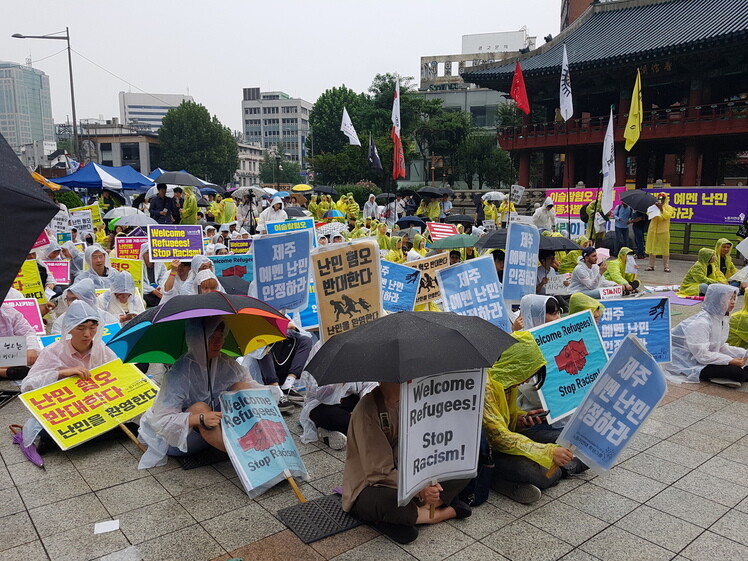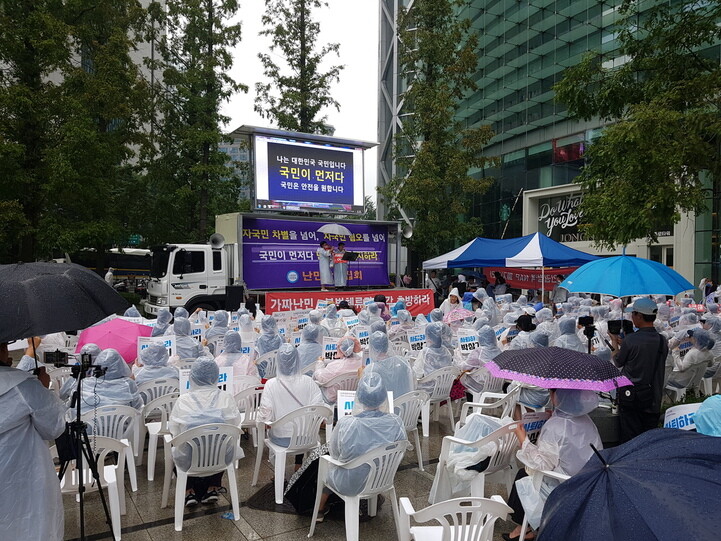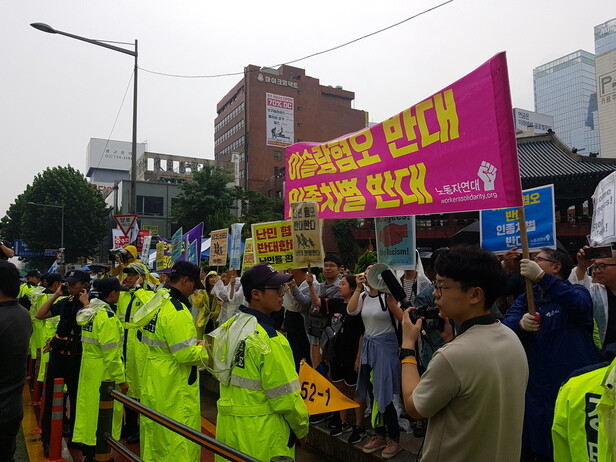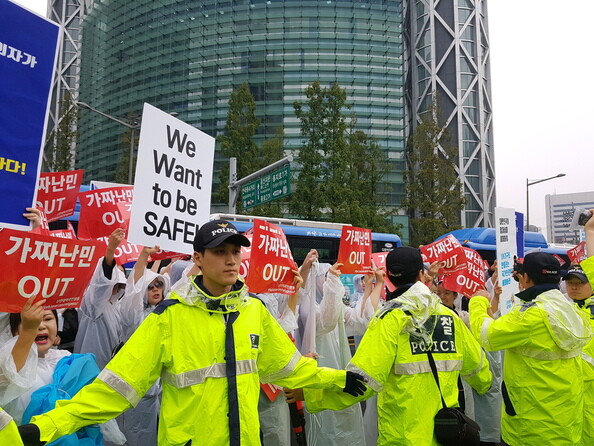hankyoreh
Links to other country sites 다른 나라 사이트 링크
Pro-refugee and anti-refugee demonstrators engage in verbal clash on Seoul city center

Under drizzling autumn skies, simultaneous rallies took place in the heart of Seoul between supporters and opponents of asylum seekers. At one point, the two groups faced off across a single road, one side shouting that “refugee human rights are civil rights” and the other that “citizens come before refugees.” The scene in central Seoul was a microcosm of the fierce debate currently unfolding in South Korea over the acceptance of refugees.
On the afternoon of Sept. 16, civic and social groups including the Center for Refugee Rights in South Korea (NANCEN), the South Korea chapter of Amnesty International, and Friends of Asia held a rally in front of the Bosingak belfry on Seoul’s Jongno Road as part of a “day of action with refugees.”
The purpose was to send a united message in response to anti-asylum seeker sentiment in South Korea. On the other side of the street at Jongno Tower, the group Citizens’ Action for Refugee Countermeasures staged its sixth anti-refugee rally, calling for the deportation of “fake refugees” and “illegal aliens.”
The demonstrators claimed that the government, rather than providing accurate information about the asylum seekers, was instead going along with a subset of the public encouraging anti-refugee sentiment and failing to honor its responsibility to protect the asylum seekers as stated in the Refugee Convention and Refugee Act.
“The government has been behaving like cowards, remain silent behind people who despise refugees because they come from different countries, religions, and ethnicities,” Korean Confederation of Trade Unions vice president Bong Hye-yeong declared from the platform.
“Rather than remaining silent any longer, [the government] must present the proper attitude and establish measures on the refugee issue that meet global standards,” she stressed.
Kim Min-young, secretary for the South Korean chapter of Amnesty International, said, “We must make a society that accepts people who have nowhere to go and provides them with safety from danger.”
“Public opinion must not be used as an excuse for jeopardizing refugee safety,” Kim said.

Human rights groups call for uniting against anti-refugee sentiment
Members of worker and LGBT rights groups and other South Korean “social minorities” announced their commitment to solidarity with the asylum seekers.
“In a country that does not protect refugees, there are no protections for citizens either,” said Lee Jeong-won of Workers’ Solidarity, adding that the group plans to “unite against anti-refugee sentiment.”
A 26-year-old demonstrator surnamed Lee, holding a rainbow-colored banner symbolizing LGBT rights, said, “Refugee human rights represent the human rights of the minorities in the most vulnerable positions in our society, which is directly linked to the human rights of other social minorities such as LGBT people.”
“As an LGBT person, I feel that solidarity on the refugee human rights issue is like speaking out about my own human rights,” Lee said.
Many refugee applicants from countries including Egypt, Syria, and Ethiopia also took part and chanted their own slogans in the demonstrations. “Abdullah,” a 26-year-old Egyptian who said he applied for refugee status in South Korea after engaging in anti-government activity back home, explained that “we [refugees] have come to South Korea to live, to survive.”
“My friends and I are asking not that you accept us against the law, but that you accept us according to the law,” he added.

Anti-refugee demonstrators call for deportation of “fake refugees”
Meanwhile, the anti-refugee demonstrators described asylum seekers in South Korea as “potential terrorists.” Referring to a recent decision granting 23 Yemeni nationals “humanitarian sojourn” status, demonstrators claimed that “groups like Al-Qaeda are abusing the fact that young people in their teens are easily granted humanitarian sojourns in order to groom minors into special forces for suicide terrorism.”
“If we can’t send them back because they are minors or pregnant women, then we should keep them in foreigner protection centers,” demonstrators suggested.
A tense confrontation briefly erupted at the scene of the demonstrations that day as members of Citizens’ Action for Refugee Countermeasures demonstrating against refugees marched close to the pro-refugee demonstrators across the street. Anti-refugee demonstrators holding signs with messages such as “fake refugees out” began shouting “citizens come before refugees” at the pro-refugee demonstrators, who responded by shouting, “We oppose anti-refugee hate.”

The verbal confrontation continued for around 10 minutes, but did not lead to any physical clashes.
Also visiting the demonstrations that day were three Egyptians involved in hunger strikes, including Zayd Abdel-Rahman, 35, who ended a 28-day-long hunger strike in front of the Hyoja Security Center in Seoul’s Jongno district on Sept. 13 after a visit by National Human Rights Commission of Korea commissioner Choi Young-ae.
Their faces showed signs of mixed emotions as they witnessed the anti-refugee demonstrations taking place in front of them.
“I respect their right to hold demonstrations and speak out,” said Abdel-Rahman, before adding,
“Terrorism means hating and attacking somehow because they have a different religion and ethnicity from you.”
“I’d like to ask which of us is closer to terrorism,” he said.
By Lim Jae-woo, staff reporter
Please direct comments or questions to [english@hani.co.kr]

Editorial・opinion
![[Column] Park Geun-hye déjà vu in Yoon Suk-yeol [Column] Park Geun-hye déjà vu in Yoon Suk-yeol](https://flexible.img.hani.co.kr/flexible/normal/500/300/imgdb/original/2024/0424/651713945113788.jpg) [Column] Park Geun-hye déjà vu in Yoon Suk-yeol
[Column] Park Geun-hye déjà vu in Yoon Suk-yeol![[Editorial] New weight of N. Korea’s nuclear threats makes dialogue all the more urgent [Editorial] New weight of N. Korea’s nuclear threats makes dialogue all the more urgent](https://flexible.img.hani.co.kr/flexible/normal/500/300/imgdb/original/2024/0424/7317139454662664.jpg) [Editorial] New weight of N. Korea’s nuclear threats makes dialogue all the more urgent
[Editorial] New weight of N. Korea’s nuclear threats makes dialogue all the more urgent- [Guest essay] The real reason Korea’s new right wants to dub Rhee a founding father
- [Column] ‘Choson’: Is it time we start referring to N. Korea in its own terms?
- [Editorial] Japan’s rewriting of history with Korea has gone too far
- [Column] The president’s questionable capacity for dialogue
- [Column] Are chaebol firms just pizza pies for families to divvy up as they please?
- [Column] Has Korea, too, crossed the Rubicon on China?
- [Correspondent’s column] In Japan’s alliance with US, echoes of its past alliances with UK
- [Editorial] Does Yoon think the Korean public is wrong?
Most viewed articles
- 1‘We must say no’: Seoul defense chief on Korean, USFK involvement in hypothetical Taiwan crisis
- 2N. Korean delegation’s trip to Iran shows how Pyongyang is leveraging ties with Moscow
- 346% of cases of violence against women in Korea perpetrated by intimate partner, study finds
- 4Amnesty notes ‘erosion’ of freedom of expression in Korea in annual human rights report
- 5‘Weddingflation’ breaks the bank for Korean couples-to-be
- 6[Column] Park Geun-hye déjà vu in Yoon Suk-yeol
- 7Will NewJeans end up collateral damage in internal feud at K-pop juggernaut Hybe?
- 8Korea sees more deaths than births for 52nd consecutive month in February
- 9“Parental care contracts” increasingly common in South Korea
- 10[Interview] Dear Korean men, It’s OK to admit you’re not always strong